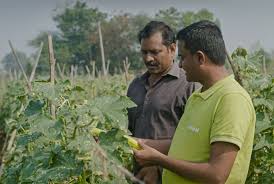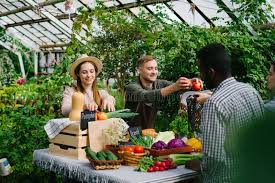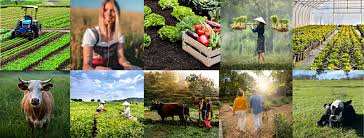Marketing agencies or intermediaries carry out marketing functions or offer marketing services. This article examines their activities to enable a better understanding of the part they play in agricultural marketing.
Who are the Marketing Agencies?
Marketing agencies are the middlemen involved in carrying out the marketing functions . They could be individuals or agribusiness organizations that specialize in performing the various marketing functions involved in the purchase or sale of goods as they are moved from producers to consumers.
Marketing agencies could be individuals acting independently, or they may be partnerships, large firms, cooperatives, or government corporations.
It is important to distinguish between the various types of middlemen by the functions and services they undertake rather than by their ownership. For example, a farmer who is the producer may also play the role of a rural buyer, wholesaler, or retailer.
Marketing middlemen could be classified into four broad groups:
i. Merchant middlemen
ii. Agent middlemen
iii. Speculative middlemen
iv. Processors and manufacturers
Read Also: The PawPaw/Papaya Ovary: Economic Importance, Uses, and By-Products
1. Merchant Middlemen

This group of middlemen takes titles to and owns the goods it handles. The merchant middlemen buy and sell for their own gain. Examples of merchant middlemen include the rural buyers, wholesalers, and retailers.
1. Rural Buyers: This group of middlemen undertakes the initial task of assembling produce from farms or local rural markets. They may be farmers who collect the produce of other cultivators. They may be landlords, village shopkeepers, wholesale merchants, processors, cooperatives, or government procurement agencies.
The rural buyer may either act on commission or purchase on their own account. They may furnish credit to the farmers and arrange for the transport of their purchase to a central wholesaling or processing point. They relieve the producers of further marketing responsibilities.
2. Wholesalers: The wholesaler has a central role to play in a marketing system. They take the product from farms or rural buyers and sell to retailers, other wholesalers in the domestic and foreign markets, or to processors and manufacturers. Wholesalers need a lot of capital to be able to have in stock large assortments of goods.
Thus, they normally take loans from the banks to run their marketing business and bear most of the marketing risks. Some of the conditions necessary for an effective wholesaling business include a place of business with accounting and communication facilities, access to capital, and good knowledge of the product handled.
3. Retailers: The main function of the retailer is to obtain supplies and display them for sale in forms and at times and places convenient for consumers. Usually, the retailer buys from one or more wholesalers, sometimes on credit, and serves consumers who buy smaller quantities on a day-to-day basis. Frequently, retailers sort, process, and repack food to suit the consumer’s individual requirements.
This may take place while the consumer watches, as in the cutting of meat, or behind the scene, where prepackaging is acceptable, as in the packing of garri into bags by garri traders in Bendel State. One marketing firm may control a number of retail outlets and may set up its own buying organization, which acts as a wholesale supplier.
Such chain store buying agencies may deal directly with processors, large producers, or producer groups, obtaining price advantages through large-scale purchases.
2. Agent Middlemen

This group of middlemen acts only as representatives of their principals. They do not normally take title to, and therefore do not own, the products they handle. They receive their income in the form of fees and commissions.
Agent middlemen in reality sell services to their clients and not physical goods to consumers. There are two types of agent middlemen, namely the commission men and the brokers.
1. Commission Agents: Producers and wholesalers frequently want to offer their produce in markets where they cannot conveniently attend in person. Commission agents specialize in buying for such people and take charge of the goods on their behalf. They are encouraged to behave well to their clients by being paid a percentage of the price obtained.
Commission agents do not normally bear marketing risks since they are operating for their principals. Commission agents are used mainly when direct offers tend to be low, or where monopsony buying is in operation.
For example, the licensed buying agents (L.B.As) of the defunct commodity boards were commission agents. Even now, the cotton merchants have commission agents buying cotton for them in the rural cotton markets. Commission agents have more power to take decisions on behalf of their principals.
2. Brokers: This group of middlemen brings potential buyers and sellers together. The function of this group is to provide an intimate knowledge of supplies, requirements, and prices in various markets. The term “broker” is restricted to agents who do not take title to or physically handle goods.
The actual transfer of ownership takes place between the original buyer and seller, with the broker acting as a counselor and intermediary in return for a fee. Brokers are in touch with a wide selection of specialized dealers and are well supplied with up-to-date information on markets and prices. Brokers can therefore offer a wider market than would otherwise be accessible to the buyer or seller.
Read Also: How to Process, Package, and Export Papayas (Pawpaw)
3. Speculative Middlemen

This group of middlemen buys the products with the aim of selling them at a time when prices rise. They often attempt to earn their profit from short-run fluctuations in prices.
Other names used for speculative middlemen are hoarders and spreaders. Speculative middlemen could be wholesalers or retailers who are willing to take greater risks. Though their immediate motive is profit, they can also perform a useful service, known as arbitrage.
They buy when prices are low and resell when prices rise. They may also buy and sell in different areas when there are differences in prices over space. If there is competition, this kind of buying and selling is useful because it can prevent prices from fluctuating between wider extremes.
4. Processors and Manufacturers
These are mainly agribusiness firms that undertake some action on farm products to change their form. Sometimes, they function as buying agents in the producing areas. Some also undertake the wholesaling of their finished products to retailers, for example, meat packers, flour mills, fruit and vegetable canners, such as Vegfru Company and Nasco Cornflakes Company in Jos.
Do you have any questions, suggestions, or contributions? If so, please feel free to use the comment box below to share your thoughts. We also encourage you to kindly share this information with others who might benefit from it. Since we can’t reach everyone at once, we truly appreciate your help in spreading the word. Thank you so much for your support and for sharing!
Read Also: Improve Your Soil: Composting Facts to Create Nutrient-Dense Soil

